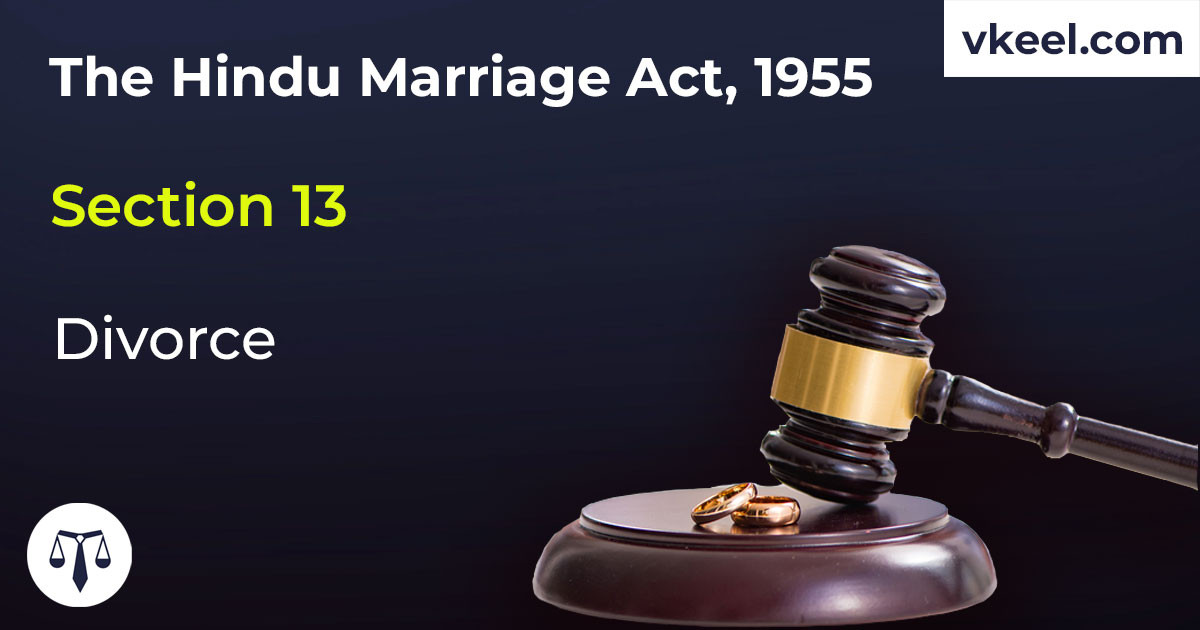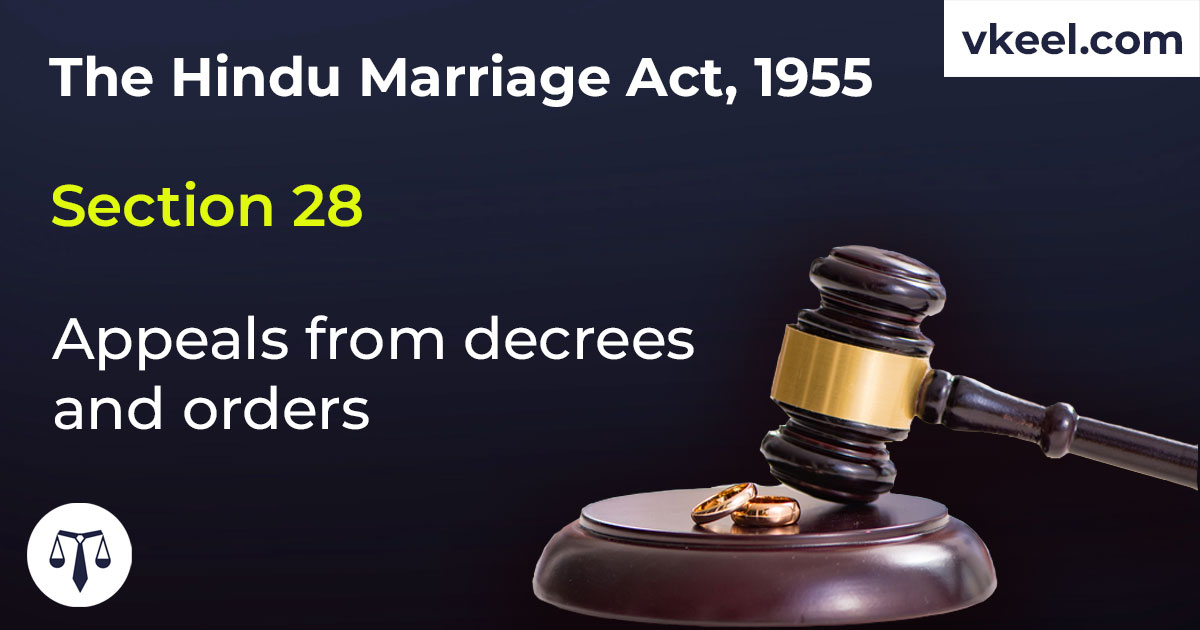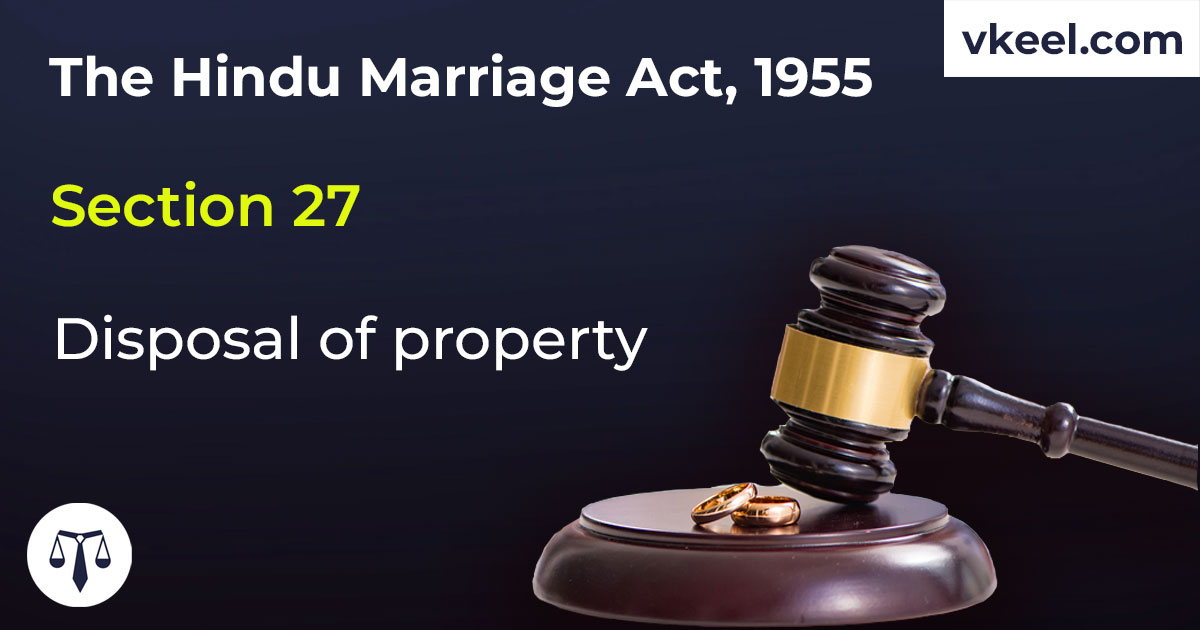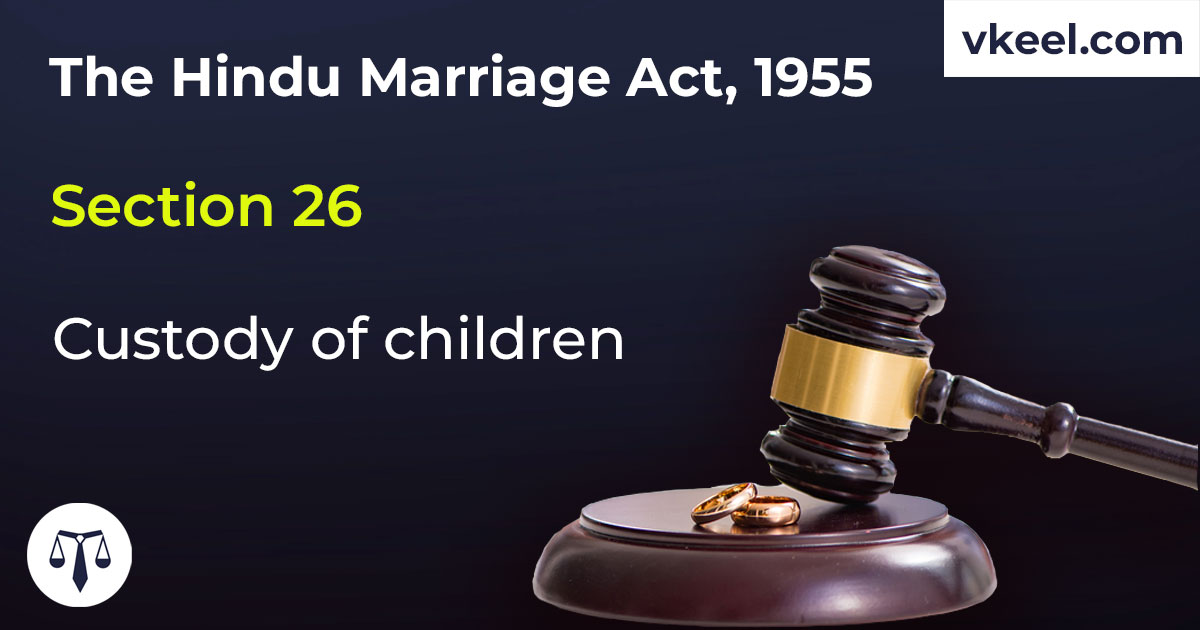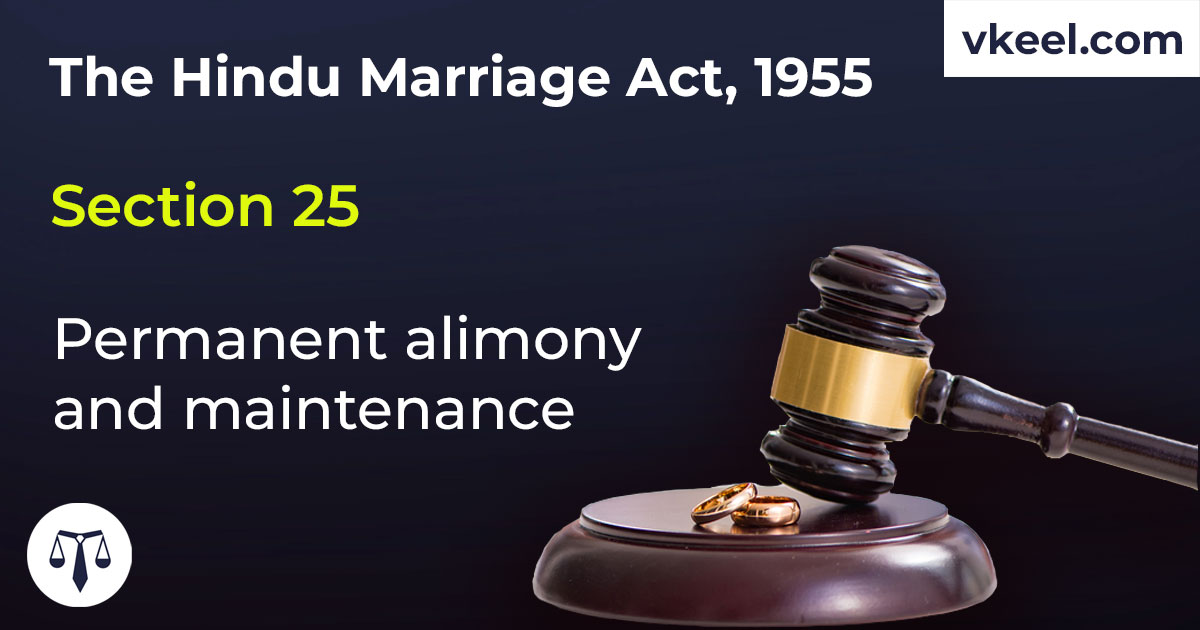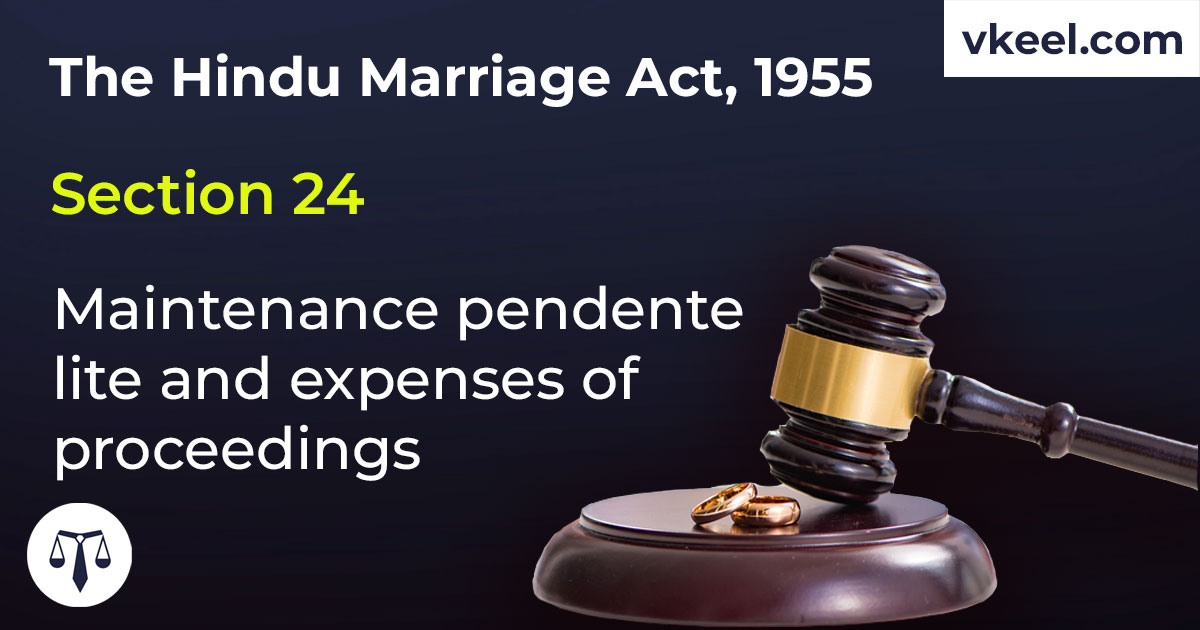Section 13 Hindu Marriage Act 1955 – Divorce
By Vkeel Team
Description
“Section 13 Hindu Marriage Act 1955”
(1) Any marriage solemnized, whether before or after the commencement of this Act, may, on a petition presented by either the husband or the wife, be dissolved by a decree of divorce on the ground that the other party–
1[(i) has, after the solemnization of the marriage, had voluntary sexual intercourse with any person other than his or her spouse; or
(ia) has, after the solemnization of the marriage, treated the petitioner with cruelty; or
(ib) has deserted the petitioner for a continuous period of not less than two years immediately preceding the presentation of the petition; or]
(ii) has ceased to be a Hindu by conversion to another religion; or
2[(iii) has been incurably of unsound mind, or has been suffering continuously or intermittently from mental disorder of such a kind and to such an extent that the petitioner cannot reasonably be expected to live with the respondent.
Explanation.–In this clause,–
(a) the expression mental disorder means mental illness, arrested or incomplete development of mind, psychopathic disorder or any other disorder or disability of mind and includes schizophrenia;
(b) the expression psychopathic disorder means a persistent disorder or disability of mind (whether or not including subnormality of intelligence) which results in abnormally aggressive or seriously irresponsible conduct on the part of the other party, and whether or not it requires or is susceptible to medical treatment; or]
3* * * * *
(v) has 3* * * been suffering from venereal disease in a communicable form; or
(vi) has renounced the world by entering any religious order; or
(vii) has not been heard of as being alive for a period of seven years or more by those persons who would naturally have heard of it, had that party been alive; 4***
5*** *
6[Explanation.In this sub-section, the expression desertion means the desertion of the petitioner by the other party to the marriage without reasonable cause and without the consent or against the wish of such party, and includes the wilful neglect of the petitioner by the other party to the marriage, and its grammatical variations and cognate expressions shall be construed accordingly.]
7[(1A) Either party to a marriage, whether solemnized before or after the commencement of this Act, may also present a petition for the dissolution of the marriage by a decree of divorce on the ground
(i) that there has been no resumption of cohabitation as between the parties to the marriage for a period of 8[one year] or upwards after the passing of a decree for judicial separation in a proceeding to which they were parties; or
(ii) that there has been no restitution of conjugal rights as between the parties to the marriage for a period of 8[one year] or upwards after the passing of a decree for restitution of conjugal rights in a proceeding to which they were parties.]
(2) A wife may also present a petition for the dissolution of her marriage by a decree of divorce on the ground,–
(i) in the case of any marriage solemnized before the commencement of this Act, that the husband had married again before such commencement or that any other wife of the husband married before such commencement was alive at the time of the solemnization of the marriage of the petitioner:
Provided that in either case the other wife is alive at the time of the presentation of the petition; or
(ii) that the husband has, since the solemnization of the marriage, been guilty of rape, sodomy or 9[bestiality; or]
10[(iii) that in a suit under section 18 of the Hindu Adoptions and Maintenance Act, 1956 (78 of 1956), or in a proceeding under section 125 of the Code of Criminal Procedure, 1973 (2 of 1974) (or under the corresponding section 488 of the Code of Criminal Procedure, 1898 (5 of 1898), a decree or order, as the case may be, has been passed against the husband awarding maintenance to the wife notwithstanding that she was living apart and that since the passing of such decree or order, cohabitation between the parties has not been resumed for one year or upwards;
(iv) that her marriage (whether consummated or not) was solemnized before she attained the age of fifteen years and she has repudiated the marriage after attaining that age but before attaining the age of eighteen years.
Explanation. This clause applies whether the marriage was solemnized before or after the commencement of the Marriage Laws (Amendment) Act, 1976 (68 of 1976).]
The Impact of Section 13 Hindu Marriage Act 1955 on Divorce in India
The Hindu Marriage Act 1955 is a landmark legislation in India that governs the marriage and divorce of Hindus. Section 13 Hindu Marriage Act 1955 deals with the grounds for divorce and has had a significant impact on the divorce process in India.
Section 13 Hindu Marriage Act 1955 outlines the grounds for divorce in India. These grounds include adultery, cruelty, desertion, conversion to another religion, mental disorder, venereal disease, and renunciation of the world. The Act also allows for a divorce to be granted on the basis of mutual consent.
The introduction of Section 13 Hindu Marriage Act 1955 has had a significant impact on divorce in India. Prior to the introduction of the Act, divorce was not a widely accepted concept in India and was seen as a social taboo. The introduction of the Act has made it easier for couples to obtain a divorce, as they no longer have to rely on the court’s discretion.
The Act has also made it easier for couples to obtain a divorce without having to go through a lengthy and expensive court process. The Act allows couples to obtain a divorce through mutual consent, which is a much simpler and less expensive process.
The introduction of Section 13 Hindu Marriage Act 1955 has also had a positive impact on the rights of women in India. Prior to the introduction of the Act, women had very limited rights in terms of divorce. The Act has given women the right to seek a divorce on the grounds of cruelty, desertion, and other grounds. This has allowed women to have more control over their lives and to be able to seek a divorce if they feel that their marriage is no longer working.
In conclusion, Section 13 Hindu Marriage Act 1955 has had a significant impact on divorce in India. The introduction of the Act has made it easier for couples to obtain a divorce, as well as giving women more rights in terms of divorce. The Act has also made it easier for couples to obtain a divorce without having to go through a lengthy and expensive court process.
1. Subs. by Act 68 of 1976, s. 7, for clause (i) (w.e.f. 27-5-1976).
2. Subs. by s. 7, ibid., for clause (iii) (w.e.f. 27-5-1976).
3. Clause (iv) omitted by Act 6 of 2019, s. 5 (w.e.f. 1-3-2019).
4. The word or omitted by Act 44 of 1964, s. 2, ibid. (w.e.f. 20-12-1964).
5. Clauses (viii) and (ix) omitted by s. 2, ibid. (w.e.f. 20-12-1964).
6. Ins. by Act 68 of 1976, s. 7 (w.e.f. 27-5-1976).
7. Ins. by Act 44 of 1964, s. 2 (w.e.f. 20-12-1964).
8. Subs. by Act 68 of 1976, s. 7, for two years (w.e.f. 27-5-1976).
9. Subs. by Act 68 of 1976, s. 7, for bestiality (w.e.f. 27-5-1976).
10. Ins. by s. 7, ibid. (w.e.f. 27-5-2976).
Description Source: indiacode
Disclaimer:
The information provided in the article is for general informational purposes only, and is not intended to constitute legal advice or to be relied upon as a substitute for legal advice. Furthermore, any information contained in the article is not guaranteed to be current, complete or accurate. If you require legal advice or representation, you should contact an attorney or law firm directly. We are not responsible for any damages resulting from any reliance on the content of this website.

